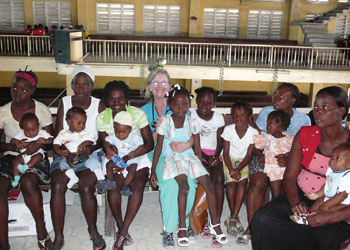
Developing new ideas
After 10 years teaching in academia, UMKC School of Nursing Professor Pat Kelly always hoped to don her nurse practitioner hat again and aid in a disaster-relief effort. Kelly says she wanted to help the Haitian people on day one, but waited two months because the country needed trauma surgeons first. On March 1, Kelly left New York with her sister-in-law, Rebecca Freeman, a nurse-midwife, and Freeman’s husband, Bill Bemis, a social worker and therapist, to work for two weeks as volunteers with the Kansas City-based agency Heart to Heart International.
“My sister-in-law and I had been talking about doing something like this for a long time, but we knew immediately that we needed to wait a bit because our services wouldn’t be very useful. We aren’t trauma people,” Kelly says. “We also knew that after a while that volunteer interest would fall off and that our training of primary health care would then be most beneficial. And while we’ve all traveled and worked in disaster primary care before, this was our first trip to a country with such limited resources. I always circle back to photographs. You always seem to think that you are experiencing what’s happening in a photo, but really you aren’t. You can’t feel it. You can’t taste the dust in the air. It was so stark and devastating and an experience I’ll never forget.”
During their two-week volunteer trip, the three wrote a journal to keep family, friends and colleagues abreast of the situation in Haiti. They shared stories from the clinic where they worked, which was situated on the second floor of a downtown church, two blocks from the destroyed main cathedral. Each day they traveled 40 minutes one way in either the back of an open pickup truck or in a tap-tap, a small covered pickup with seats in the back that served as a taxi, to assist up to 175 to 200 Haitian men, women and children with non-medical emergencies. The clinic treated everything from pneumonia to diarrhea, as well as cases of tuberculosis and HIV, Kelly says.
Kelly says the medical practices she witnessed while working at the clinic prompted her to return alone to Haiti in May for 10 days and to write the editorial, Providing International Work in the Void of Cultural Context. Kelly plans to present her editorial at an upcoming nursing conference this year.
“People want to go over and help, but so many don’t understand that the medical practices we have here aren’t appropriate there,” Kelly says. “Some people were diagnosing things that there aren’t any treatments for in Haiti. People forget that this country even has limited facilities for birthing babies. The reality was that health care providers just couldn’t wrap their heads around this.”
As for classroom discussions, Kelly says she hasn’t spoken of her visits to Haiti much with nursing students because for them, it’s the hands-on experience that matters. However, her trip hasn’t stopped her from discussing new programming ideas with the dean of the School of Nursing. Days after returning from her second trip, Kelly says she began writing a proposal for programming that would focus on third-world country nursing needs and explained that similar programs already exist at other state institutions.
“After coming back, I noticed all that we have around us,” Kelly says. “I wanted to do what I knew best to help. This proposal is one such way. I’ve also been trying to figure out how I can volunteer on a long-term basis. I was pretty gripped by Haiti, and I’m already planning my visit back.”
